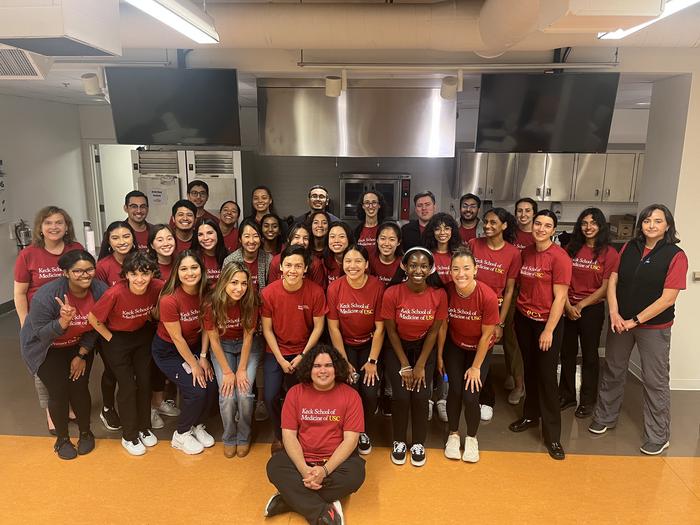Primary care provides critical support for the global health care system. But in many communities across the country and around the world, primary care physicians are in short supply.

Credit: Bryan Ayala-Rivera
Primary care provides critical support for the global health care system. But in many communities across the country and around the world, primary care physicians are in short supply.
To help bridge that gap and inspire more students to choose careers in primary care, the Keck School of Medicine of USC launched its Primary Care Initiative in 2011. A key part of the initiative, the Primary Care Program (PCP), is an educational track that provides medical students with a range of patient-centered, hands-on experiences in the local community to prepare them for a career in family medicine, internal medicine or pediatrics.
A review of PCP data over the past eight years, just published in the journal Family Medicine, reveals the program’s success at recruiting students and guiding them toward careers in primary care. Among PCP graduates, 70% matched into primary care residencies after medical school, compared to just 36% of non-PCP graduates from the Keck School of Medicine. Additionally, across the school, more students matched into primary care residencies in the eight years after the program launched compared to the eight years before.
“In a world where we don’t have enough primary care providers, we’re exposing students early to the many joys and opportunites within primary care fields. The success of this program can serve as a roadmap for other institutions,” said the study’s lead author, Jo Marie Reilly, MD, MPH, a professor of family medicine and director of the Primary Care Initiative at the Keck School of Medicine.
Thirty-nine percent of PCP graduates came from backgrounds that are underrepresented in medicine. Many reported coming to KSOM specifically because of the program, Reilly said, and plan to return to serve their communities after they finish training.
“We’re attracting diverse students, training them to become primary care leaders, and providing them with multiple clinical tools to do it,” she said.
Skill-based training
The Keck School of Medicine’s PCP provides students with a series of patient- and community-centered experiences that help them develop the skills and expertise central to a successful career in primary care medicine. Highlights include long-term mentorship with a primary care physician in the local community, where students work directly with patients in an outpatient setting; health education and community advocacy training to provide nutrition, exercise and cooking classes for patients in Los Angeles County; research opportunities; leadership and interprofessional skills-based training in older adult care; and learning alongside a cohort of like-minded students.
“The multi-faceted nature of the program is really what’s special here,” Reilly said. “We’re doing skill-based, hands-on training to prepare students to work in primary care.”
In the eight years before the program began, 33% of Keck School of Medicine students matched into primary care residencies after graduation. In the eight years after it launched, 39% matched into primary care residencies.
Between 2015 and 2022, 134 students completed the PCP, with 70% matching into primary care residencies. Thirty-seven percent of graduates went into family medicine, 16% into internal medicine and 10% into pediatrics.
Of program graduates, 70% were female, 29% were Asian, 29% were Latino, 10% were Black, and 1% came from a different racial or ethnic background. Overall, 39% of program graduates came from groups traditionally underrepresented in medicine.
Providing a roadmap
Reilly and her coauthor, Ilana Greenberg, MPH, who manages the PCP, are now analyzing data on alumni of the program. Many continue to work in community settings, are teaching the next generation of PCP students, and have even taken on clinical and community leadership roles.
Part of what’s unique about the Keck School of Medicine’s program is its success in graduating students who serve local communities, even from a private, research- and subspecialty-focused institution that does not receive state or federal funding, Reilly said.
“This program can serve as a model for other schools interested in increasing the ranks of primary care physicians,” Greenberg said.
About Keck School of Medicine of USC
Founded in 1885, the Keck School of Medicine of USC is one of the nation’s leading medical institutions, known for innovative patient care, scientific discovery, education and community service. Medical and graduate students work closely with world-renowned faculty and receive hands-on training in one of the nation’s most diverse communities. They participate in cutting-edge research as they develop into tomorrow’s health leaders. The Keck School faculty are key participants in training of 1200 resident physicians across 70 specialty and subspecialty programs, thus playing a major role in the education of physicians practicing in Southern California.
To learn more about the Keck School of Medicine’s Primary Care Program, visit primarycare.usc.edu.
Journal
Family Medicine
DOI
10.22454/FamMed.2023.297644
Method of Research
Data/statistical analysis
Subject of Research
People
Article Title
An 8-Year Review of Match Outcomes From a Primary Care Pipeline Program
Article Publication Date
24-Jul-2023




